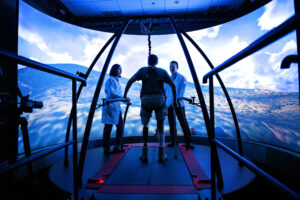The Midwestern University College of Health Sciences will debut a new O&P program that is set to welcome its first cohort of 20 students in August. The Master of Science in Orthotics and Prosthetics program will be the only one of its kind in Arizona and one of 15 nationwide. The 30-month curriculum is designed to prepare the newest generation of O&P professionals as client-centered clinician-scholars.

The 156-credit hour curriculum consists of two connected phases of learning. In the 12-month on-campus didactic phase, students engage in clinically oriented coursework involving client-centered assessment and treatment, movement sciences, anatomical and physiological sciences, orthosis and prosthesis engineering design and fabrication, fitting and clinical outcome assessment, scholarly inquiry, and interprofessional collaboration. During the 18-month off-campus residency/evidence-based practice phase, students are matched to a series of planned residency site rotations involving a network of clinical site preceptors and faculty who guide students to achieve individualized learning goals.
Christopher Hovorka, PhD, CPO, FAAOP, director and assistant professor will lead the program. Hovorka is a 30-year O&P veteran, with educational, research, and clinical experience in exercise science, allied health science, and applied physiology/motor control. Program faculty members include Kristin Carnahan, MSPO, CPO, FAAOP, who has 14 years of experience in clinical practice and academia. She will teach on-campus courses in the first year of the curriculum. Kari Pichora, MSPO, CPO, brings nine years of clinical practice experience to the program to manage the embedded residency portion of the curriculum. The university expects to hire more personnel, including two more full-time faculty, several part-time adjunct faculty, a full-time lab manager, and a full-time administrative coordinator.
“Just recently we opened the application portal and we have received about ten students. Given that the application portal has only been [operational] for several days since opening, we anticipate an increase in class size over time as our web presence and awareness evolves,” he said.
Hovorka said Midwestern’s curricular approach is somewhat novel for an O&P program because of its goal to create “the next generation of O&P professionals as ‘client-centered practitioner scholars’ in a competency-based curriculum,” he said.
The university will integrate elements of clinical simulation to help reinforce student learning of clinical skills and reasoning and even a few technical fabrication skills, Hovorka said.
“Midwestern University has very well-developed facilities and staff to assist our faculty in creating reliable methods of assessment which historically, have not been validated in O&P,” he said. “So this will be another strength to our curricular approach.”
Digital elements—scanning, rectification, and 3D printing—to complement the traditional forms for training and instruction will be added in the O&P clinical labs and manufacturing labs. “Students will learn methods of assessment and device production using digital methods and traditional hand-skill methods. This hybrid approach, we think, will better prepare the next generation of graduates for current practice and the digital transformation that is occurring in healthcare and medical device manufacturing.”
This will be the third O&P master’s program nationwide to include an embedded residency experience, along with Baylor University and Salus University.
The response to the program so far has been very positive, Hovorka said.
“We have been receiving many inquiries from representatives in the O&P profession, PT and OT profession, design engineers that are interested to learn more about the model of a client-centric practitioner-scholar that we are aspiring to produce as future graduates,” he said.
As part of the College of Health Sciences, the interprofessional O&P graduate program will collaborate with related rehabilitation programs in didactic and applied client-centered learning, including osteopathic medicine, occupational and physical therapy, physician assistant, podiatry, and nurse practitioner. Hovorka said the Midwestern University program is the only one in the United States to incorporate a Computer Assisted Rehabilitation Environment (CAREN) into its curriculum, and will also have new, state-of-the-art facilities located on the university’s Glendale campus, which will include:
- Gait and movement analysis lab
- Clinical skills simulation lab
- Clinical assessment and treatment outcomes lab
- Technology design and innovation lab
- Machine room
- Thermoforming and laminating rooms
- Digital shape capture, rectification, and 3D printing lab
The program has received approval by the state of Arizona Board of Private Post-Secondary Education and is seeking accreditation from the National Commission on Orthotic and Prosthetic Education.




